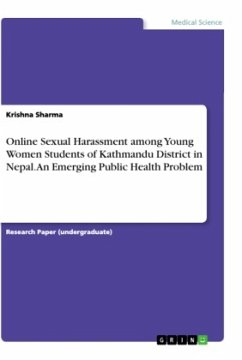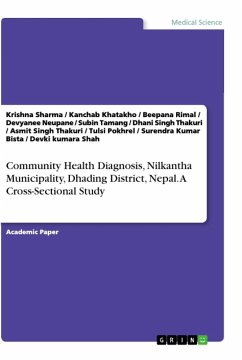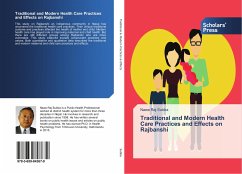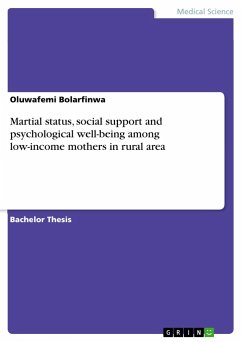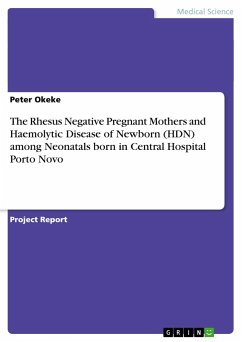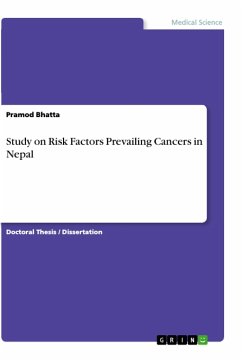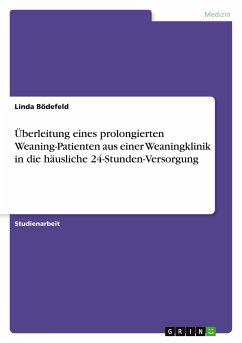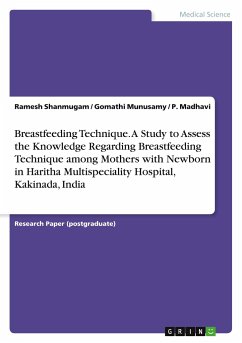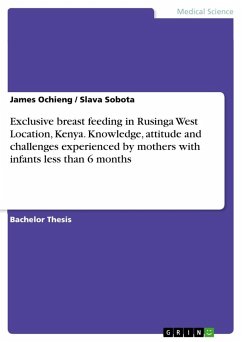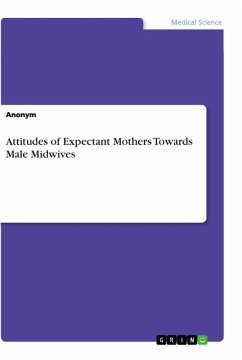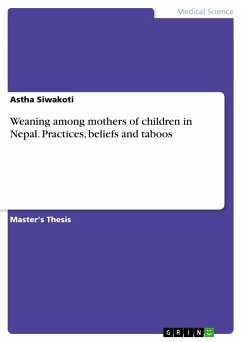
Weaning among mothers of children in Nepal. Practices, beliefs and taboos

PAYBACK Punkte
0 °P sammeln!
Master's Thesis from the year 2014 in the subject Health - Public Health, Rajiv Gandhi University (padmashree school of public health), course: Masters in public health, language: English, abstract: The study was conducted in Sinam VDC of Taplejung district of Nepal. It is descriptive cross sectional study. The data collection methods were used for this study was semi structure questionnaire to assess practice and structured guideline for Focussed Group Discussion to understand the beliefs and taboos on weaning in the area. Results: A total of 120 mothers with children aged between 3 month to ...
Master's Thesis from the year 2014 in the subject Health - Public Health, Rajiv Gandhi University (padmashree school of public health), course: Masters in public health, language: English, abstract: The study was conducted in Sinam VDC of Taplejung district of Nepal. It is descriptive cross sectional study. The data collection methods were used for this study was semi structure questionnaire to assess practice and structured guideline for Focussed Group Discussion to understand the beliefs and taboos on weaning in the area. Results: A total of 120 mothers with children aged between 3 month to around 3 years were included to assess the weaning practice of which 49.2% were below 1 year, 35% were within 2 years of age, 14.2% less than or of 3 years of age, 1.7% were above 3 years.52.5% of children were male and 47.5% were female.33.3% of families had 2 children and 15.8% of families had 5 children. Majority of them belonged to Janajati(35%) which was predominant ethnic group. Majority of respondents belonged to Hindu religion (66.7%) 34.7% of respondents had primary level of education. There is significant relationship between mother's education and weaning practice in the study. Farming (25%) and foreign employment (51.7%) were major source of income and occupations followed in the area. 90.8% belonged to middle class in the wealth index. Calculations showed that there is positive association between income range and weaning practice.47.5% of mothers introduced weaning foods before 6 months of age of infants, 40% after 6 months and 12.5% before 1 month. Most common types of weaning foods in this study area were sarbottam pitho(81.8%) and khole (47.1) with rice as a staple diet.85.83% of respondents still breastfed their child along with complementary feeding.14.17% of them expressed their view that breast milk was not sufficient and not required after certain age.75% of respondents were conscious enough to do night feeding to the baby and remaining 25% were reluctant to the practice.58.3% of respondents had the knowledge on need of sterilization of feeding equipment.72.5% of them had appropriate weaning practice. Focused group discussion on beliefs and taboos revealed that Cultural factors and taboos have a powerful influence on feeding practices and eating patterns. Young mothers often find it impossible to ignore their ill-informed elders or peer group. Children were being fed three or more meals daily for reasons of hunger and satiety, stomach capacity and adequate growth. Traditional/cultural food preparation beliefs/practices were still adhered to.However, some participants thought that some of these practices were old fashioned and needs change.




